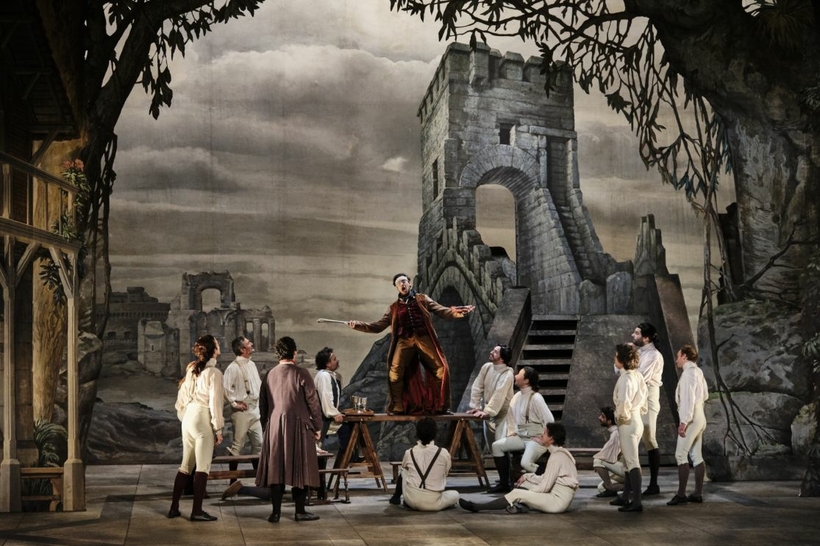André Modeste Grétry’s Richard Cœur de Lion, which premiered in Paris in 1784, tells the apocryphal tale of the gung-ho but unsuccessful royal crusader of that name, who on his way home from the Holy Land has vanished into a secret prison. There he seems doomed to perish—but for the luck, pluck, and virtue of his loving minstrel Blondel.
Though scarcely a footnote today, the masterwork of Marie Antoinette’s favorite composer had no end of connoisseur admirers in its time. Beethoven tossed off a charming set of piano variations on one of its numerous hit tunes. Tchaikovsky quotes another in his tremendous Pikovaya Dama. In 1789, Louis XVI and the queen caught the royalist fantasy at the Royal Opera at Versailles shortly before the French Revolution sent them packing. Not until October 2019 would Richard Cœur de Lion return to that stage, directed by Marshall Pynkoski and choreographed by Jeannette Lajeunesse Zingg, with sets by Antoine Fontaine, costumes by Camille Assaf, and lighting by Hervé Gary—enchanters all.
What a treat for eyes and ears! At the remove of 230 years, the score’s airs and ensembles strike us as old-fashioned yet at the same time sparklingly fresh. Blazing new trails in the spirit of Jean-Jacques Rousseau, Grétry leaves behind the deliberate artifice of the Baroque. The score’s flexible, homespun melodies for voices and instruments whisk us back willy-nilly to the Age of Innocence. There’s heart in Grétry’s music yet nothing sentimental; there’s liveliness of expression, yet no striking of poses.

The toy-theater look of the production reinforces Grétry’s Romantic ethos. Never mind that the action is set in the Middle Ages. Audiences of the period expected players to look like people they could see on a promenade. Not the least of the show’s charms are the men of the chorus and corps de ballet parading in tin-soldiers’ three-cornered hats, sharp tailcoats, and snowy military leggings.
The anxious confession of forbidden love we recognize from Pikovaya Dama, exquisitely sung by the soprano Melody Louledjian as the jailer’s daughter Laurette, has all the Proustian perfume we could hope for. But it’s the two principal tenors who touch us the most. Rémy Mathieu lends Blondel, with his heart of gold, tones that are limber, lean, and lithe. As the lion-hearted Richard, Reinoud Van Mechelen displays a rounder, more sensual timbre with a greater charge of pathos, especially at the magic moment when he blends his voice with that of his unseen, long-lost friend in a tune known only to the two of them.
Throughout, Hervé Niquet leads his cast and the period ensemble Le Concert Spirituel with a deft, fleet hand. Expect a lot of Easter eggs—the rambunctious sallies from the chorus, for instance, plus a tempestuous intermezzo spun of starshine and thunderbolts.
Richard Cœur de Lion is available for streaming on medici.tv
Matthew Gurewitsch writes about opera and classical music for AIR MAIL.He lives in Hawaii

